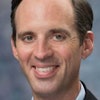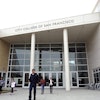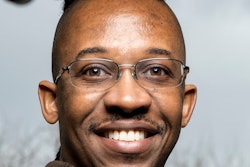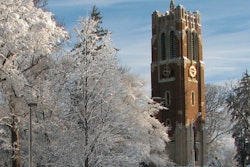Clusterluck, a documentary short produced by Dr. Candace N. Hall, graduate program director and assistant professor for the higher education and student affairs program at Southern Illinois University Edwardsville (SIUE), begins on a sobering note. White text on a black background tells us that African Americans make up only 5.4% of the full-time faculty in post-secondary education. As an unsettling synth beat plays, a quote from a recent study fades in: “Many institutions have recruited underrepresented scholars to join their faculty without attention to retaining and supporting the new recruits.”
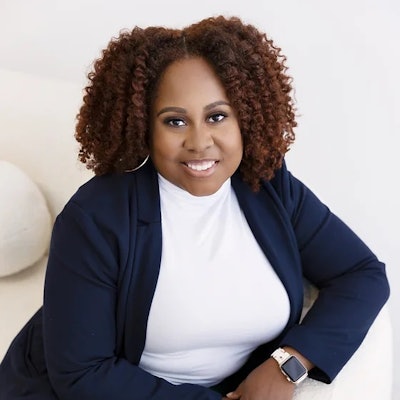 Dr. Candace N. Hall, graduate program director and assistant professor for the higher education and student affairs program at Southern Illinois University Edwardsville
Dr. Candace N. Hall, graduate program director and assistant professor for the higher education and student affairs program at Southern Illinois University Edwardsville
Clusterluck is a portrait of the community that developed among faculty of color centered in the department of educational leadership at SIUE, several of whom were recruited in 2020 as part of a cluster hire—a deliberate attempt to appoint several faculty with similar backgrounds or research interests who can work together and, ideally, create a sense of belonging.
In assembling this cluster, Dr. Robin Hughes, dean of the SIUE School of Education, Health, and Human Behavior, succeeded wildly.
“I hadn’t anticipated anything like the environment of care that they created,” she says in the film. “It’s spectacular.”
Her most significant hire to the creation of this environment was Hall.
“She is so unselfish,” said Hughes. “She is so concerned about her academic siblings.”
Shortly after being hired, however, it was Hall who needed help. She felt unsure of her decision to join SIUE, but found reassurance from Dr. J.T. Snipes, a fellow African American professor. They began talking and hanging out in Hall’s backyard, and the gatherings eventually evolved into bi-weekly bonfires on Friday nights, with about 10 others: five from the department of educational leadership, a few from other departments, and the professors’ partners.
Members of this community helped each other with the unique difficulties that can come with being Black in the academy. Hall was once berated by a custodian who, not realizing that she was a faculty member, told her that she wasn’t allowed to be in a campus building in the evening. They also helped each other navigate the pandemic while having children, and through the ups and downs of life, including the deaths of loved ones.
“Knowing that I was going to see them every two weeks around that bonfire really saved my life,” said Hall.
People began encouraging her to write about what was going on. But Hall had a different idea.
“It’s one thing for people to read about it on the page,” she said. “But I felt like if people could see it, could feel what the community feels like to us, they would care about it in a different way.”
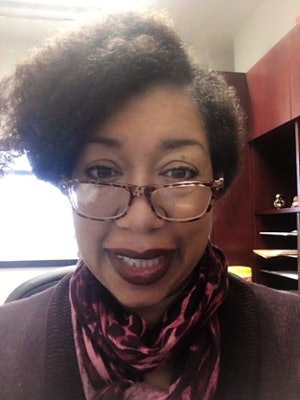 Dr. Robin Hughes, dean of the SIUE School of Education, Health, and Human Behavior
Dr. Robin Hughes, dean of the SIUE School of Education, Health, and Human Behavior
“We’re not here to write 5,000 papers that 2,000 people are going to read,” she says in the film. “We’re here to effect change.”
Hall ultimately found her film-making partners on Instagram, connecting with My Friends and I, a St. Louis-based production company led by Cami Thomas, who became Clusterluck’s director. After Hall’s institutional funding ran out, she put in roughly $5,000 of her own money.
The response to the final product has shocked Hall. Audience members have called it brilliant. Others have cried. Although she had imagined showing it at academic conferences, people encouraged her to submit it to film festivals. At the IndieFest Film Awards, she and Thomas won an award of recognition.
Hall hopes that Clusterluck can serve as a counterpoint to the often-dispiriting stories that are told about African American academic life.
“There are a lot of Black faculty that have a different experience, but we don’t often hear that narrative,” she said. “Part of my hope is that people can see, white people in particular, that Black joy is possible. We should be doing work to invest in it.”
Hall thinks that the film could also impact Black students.
“Seeing Black faculty thriving might change how they think about their own retention, their own persistence in their academic programs,” she said.
Hall is currently traveling around the country with Clusterluck and submitting it to additional festivals. She’s working on a project showing the impact of the conversations around the film, as well as addressing questions of scalability and sustainability. Hall is also trying to get funding for her next piece of creative scholarship, which will use video and photos to tell the stories of Black faculty.
For the moment, however, Clusterluck is extending Hall’s impact far beyond the community that she helped to build at SIUE. She wants more universities to seriously consider how to help their new African American teachers adjust to the institution and find support and believes that the film can play a role.
“I don’t care for my work to only live in journals,” said Hall. “I want my work to really push the needle in changing how Black faculty experience the academy. To me, that’s the ultimate reward.”
Jon Edelman can be reached at [email protected]



